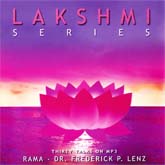
Lakshmi Series
Living and Working In The World
The greatest challenge awaiting you is living and working in the world.
Traditionally, seekers of the infinite light have renounced society and gone into places of solitude to meditate, pray, fast, practice various spiritual arts and to gain a sense of community, a fellowship with others who speak a kindred language.
If we look back at the history of spirituality, we see that the great, enlightened souls were often very reclusive. They lived on top of the high Himalayas, in caves and forests. Very few of them really entered into the world, or if they did live in somewhat of a societal setting, they had their students build monasteries, convents, ashrams - places where the students and the teacher could live together and associate with each other without having to deal with the world.
The reason they did this is certainly self-evident. Most people in this world are not interested in light and spiritual development at this stage in their evolution. They're still playing their war games, their oppression games. They're still trying to limit others in the name of their own happiness. As a matter of fact, after you have practiced meditation and spirituality for some time, you begin to get a sense that you're on the wrong planet. There's a feeling that you don't belong here because when you look at the world, you look with eyes of love and joy and beauty. And when you enter into the nine-to-five world, the competitive business world, the world of freeways, nations, wars, political systems, families, ethnic groups, power groups - the world, as you know, is not a particularly attractive place, the world that men and women have created.
This earth itself is nothing but beauty. But human beings have been a disease, from a certain point of view, a kind of a bacteria that has infected the earth, that has destroyed the forests, the rivers, polluted the oceans, that is currently destroying the ozone layer. Human beings have not taken very good care of the resource that sustains them. They don't seem to realize that if they destroy it, they destroy themselves. A most unusual species.
Yet taken individually, human beings are incredibly beautiful. If we look at any person, they have sensitivities, inner light. While they may be in a certain stage in their evolution where they're a little confused, just as a third grader does not know everything, we can't necessarily find fault with them for that. They're doing the best they can with what they have. Indeed, what we should have is an attitude of tolerance, not of perdition. We should feel that all of humanity is our family - and I always think it's a good idea to put as much distance between yourself and your family as possible (Rama laughs), unless, of course, you have an exceptionally enlightened family.
In today's world it's really impossible to get away from humanity. We live in a media jungle, what McLuhan called a global community. All of us are joined together by media - television, satellites, newspapers, magazines. Even if you live out in the far reaches - there are no longer far reaches - because in an instant, through the marvelous aid of electronics, you can be in touch with any part of the world. As a matter of fact, it's pretty hard to avoid it.
The problem is that a great deal of the information that comes down the pike is not very good. The consciousness of most human beings has a certain focus. And while all people are good and many people think noble thoughts, by and large we live in a world that is interested in sensations. The news that greets us is in many ways very similar to the sights that greeted those who went to the Roman Coliseum to watch the games. There's an urge within the human species for blood, for violence. People derive a strange pleasure from hearing about the misfortunes of others. This is the way the world is. To think badly of the world or of humanity for being this way is like condemning, again, all the second and third graders in the world. Tolerance is necessary.

